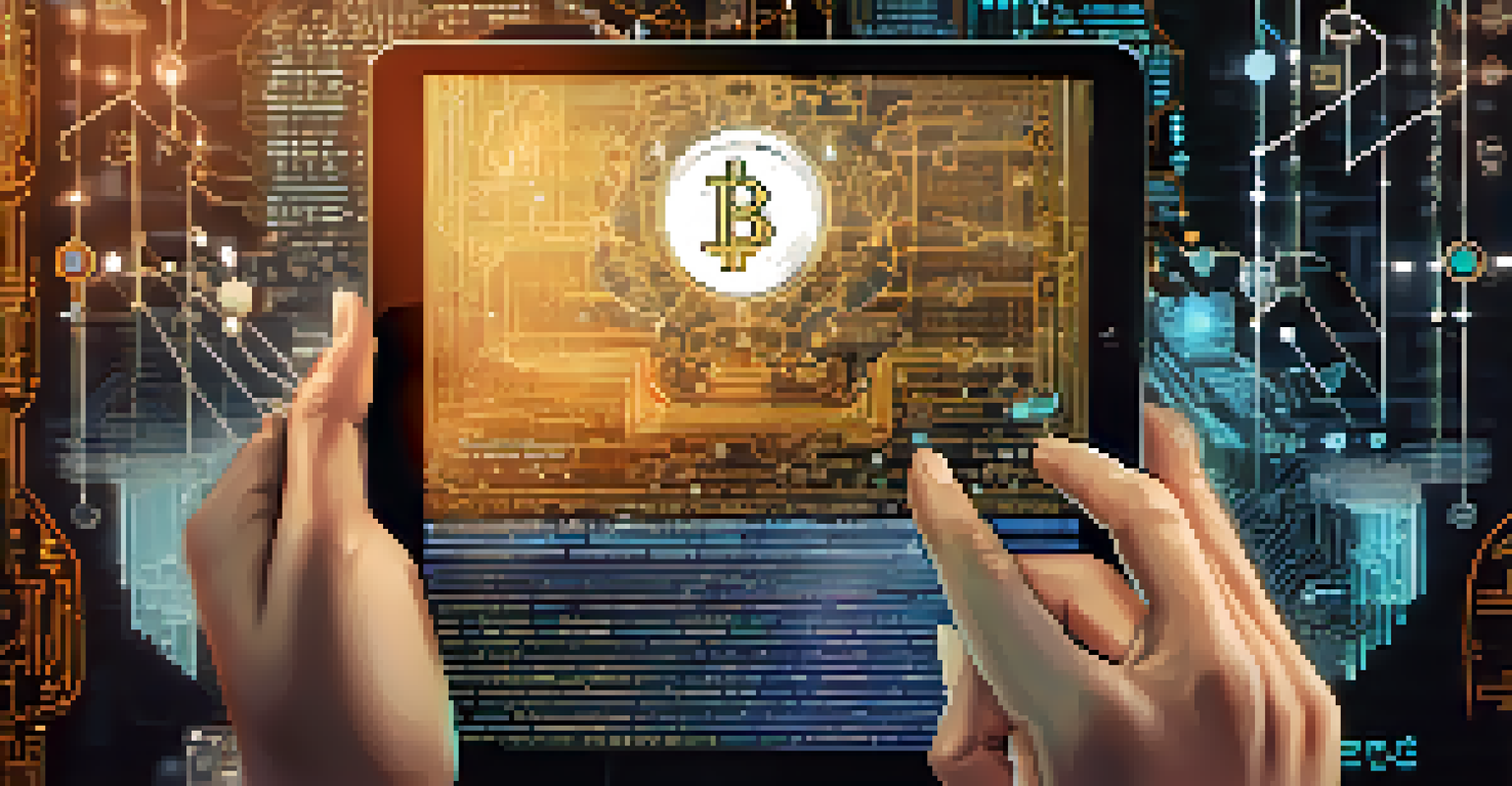Legality of NFT Auctions: A Comprehensive Legal Review

What Are NFTs and Why Do They Matter in Auctions?
Non-fungible tokens (NFTs) are unique digital assets that represent ownership of a specific item or piece of content on the blockchain. Unlike cryptocurrencies like Bitcoin, which are identical and can be exchanged for one another, NFTs are one-of-a-kind, making them particularly valuable in the realms of art, music, and collectibles. This uniqueness is what drives their popularity in auction settings, where buyers are often willing to pay a premium for ownership of something scarce.
The blockchain is the most important technology since the invention of the Internet.
The rise of NFTs has revolutionized the auction industry, introducing new dynamics and opportunities for both creators and buyers. Artists can sell their work directly to fans without the need for intermediaries, while collectors can invest in digital assets that may appreciate over time. However, the novelty of NFTs also raises important legal questions regarding ownership, copyright, and the implications of digital transactions in an auction context.
As the market continues to grow, understanding the legal framework surrounding NFT auctions becomes crucial. Issues such as intellectual property rights, consumer protection, and tax implications can significantly impact participants in the NFT space. Thus, a comprehensive legal review is essential for anyone looking to navigate this exciting yet complex landscape.
The Legal Framework Governing NFT Auctions
NFT auctions operate within a complex legal framework that includes intellectual property law, contract law, and regulations related to digital assets. Intellectual property rights are particularly important, as they determine who can claim ownership of the underlying content associated with an NFT. For instance, if an artist sells an NFT of their artwork, the buyer may not automatically acquire copyright unless explicitly stated in the sale agreement.

Contract law plays a significant role in NFT auctions, as the terms of the sale are typically outlined in a smart contract on the blockchain. These contracts can automate transactions and enforce terms, but they also raise questions about enforceability and jurisdiction. If a dispute arises, determining which laws apply can be complicated, especially when buyers and sellers are located in different countries.
NFTs Redefine Auction Ownership
Non-fungible tokens (NFTs) offer unique digital ownership, changing how art and collectibles are bought and sold.
Additionally, the evolving regulatory landscape for digital assets adds another layer of complexity. Governments worldwide are beginning to establish guidelines for cryptocurrencies and NFTs, addressing issues such as anti-money laundering (AML) and know your customer (KYC) regulations. Participants in NFT auctions must stay informed about these changes to ensure compliance and mitigate legal risks.
Intellectual Property Rights in NFT Auctions
When it comes to NFTs, understanding intellectual property rights is paramount. An NFT may provide proof of ownership for a digital asset, but it doesn't automatically grant the buyer all rights associated with that asset. For example, a buyer may own an NFT of a digital painting, but the artist retains the copyright, meaning they can still reproduce or license the artwork unless the sale agreement states otherwise.
Digital ownership is a concept that will become increasingly important in the future, as more of our lives are represented in digital form.
This distinction can lead to confusion and potential legal disputes if buyers assume they have broader rights than they actually do. It's essential for both creators and collectors to clearly outline the terms of ownership, usage rights, and any limitations when creating and purchasing NFTs. Clear communication can help prevent misunderstandings and foster a more transparent marketplace.
Furthermore, as NFT technology evolves, so too does the legal landscape surrounding intellectual property. Courts are still grappling with how traditional IP laws apply to digital assets, and new cases are likely to emerge that will set important precedents. Staying updated on these developments is crucial for anyone involved in NFT auctions.
Consumer Protection Issues in NFT Auctions
Consumer protection is a critical consideration in NFT auctions, especially given the rapid growth and volatility of the market. Buyers may find themselves vulnerable to fraudulent schemes, misrepresentation, or even scams, making it essential for them to conduct due diligence before participating in an auction. Understanding the platform's reputation and the authenticity of the NFT being sold can help mitigate these risks.
Additionally, the lack of regulation in the NFT space raises concerns about the recourse available to consumers in case something goes wrong. Unlike traditional auctions, where buyers have established rights and protections, the digital nature of NFT transactions can complicate matters. Buyers may have limited options for recourse if they discover that they were misled or if an NFT is found to be counterfeit.
Legal Framework Impacts NFTs
The complexities of intellectual property, contract law, and evolving regulations create a challenging landscape for NFT auctions.
As the industry matures, there is growing pressure for more robust consumer protection measures to be implemented. This may include clearer guidelines on disclosures, transparency in transactions, and mechanisms for dispute resolution. For participants in NFT auctions, being aware of these issues can empower them to make informed choices and advocate for their rights.
Tax Implications of NFT Auctions
Tax implications are another important aspect to consider in NFT auctions. Both buyers and sellers may be subject to capital gains tax, depending on the jurisdiction and how the transaction is structured. For example, if an artist sells an NFT for a profit, they may owe taxes on that gain, while buyers might face tax liabilities if they later sell the NFT for a profit.
Understanding how NFTs are classified for tax purposes can be complex, as different countries may have varying regulations regarding digital assets. Some jurisdictions treat NFTs as personal property, while others may classify them as securities. This classification can significantly impact the tax obligations of participants in the NFT market.
As the IRS and other tax authorities continue to refine their guidelines for digital assets, staying informed is crucial. Participants should consult with tax professionals to ensure compliance and understand their obligations when engaging in NFT auctions. This proactive approach can help prevent surprises during tax season and ensure that all transactions are handled appropriately.
The Role of Smart Contracts in NFT Auctions
Smart contracts play a vital role in the functioning of NFT auctions, automating processes and ensuring transparency between parties. These self-executing contracts, built on blockchain technology, can automatically enforce terms agreed upon by buyers and sellers, reducing the risk of disputes. For example, once the payment is made, a smart contract can instantly transfer ownership of the NFT to the buyer without the need for intermediaries.
However, while smart contracts can streamline transactions, they also raise important legal considerations. Issues such as code accuracy, security vulnerabilities, and the potential for unintended consequences can complicate matters. If a smart contract contains flaws, it could lead to financial losses or disputes that may be difficult to resolve in court.
Consumer Protection is Vital
As the NFT market grows, ensuring buyer protection against fraud and misrepresentation becomes increasingly crucial.
As the use of smart contracts in NFT auctions grows, understanding their legal implications becomes increasingly important. Participants should not only be aware of how these contracts function but also consider the potential risks involved. Engaging with reputable platforms that prioritize security and transparency can help mitigate these concerns.
Future Trends in the Legal Landscape of NFT Auctions
The legal landscape surrounding NFT auctions is continually evolving, and several trends are emerging that could shape the future of the market. As more consumers and businesses engage with NFTs, there will likely be increased scrutiny from regulators looking to establish clearer guidelines and protections. This could lead to a more structured environment that fosters trust and security for all participants.
Additionally, as legal cases involving NFTs rise, precedents will be set that can influence how intellectual property and consumer protection laws apply to digital assets. These developments will be crucial in defining the rights and responsibilities of creators, sellers, and buyers in the NFT space. Staying informed about these trends will be key for anyone looking to navigate the market successfully.

Furthermore, there may be advancements in technology that enhance security and transparency in NFT auctions, addressing some of the current concerns about fraud and misrepresentation. Innovations such as improved authentication methods and more sophisticated platforms could help create a safer environment for participants, ultimately leading to a more sustainable NFT market.